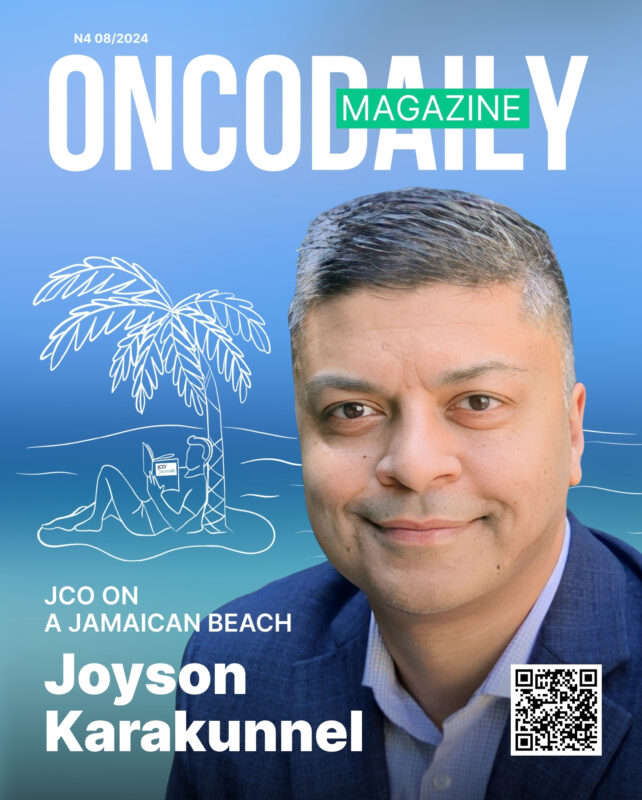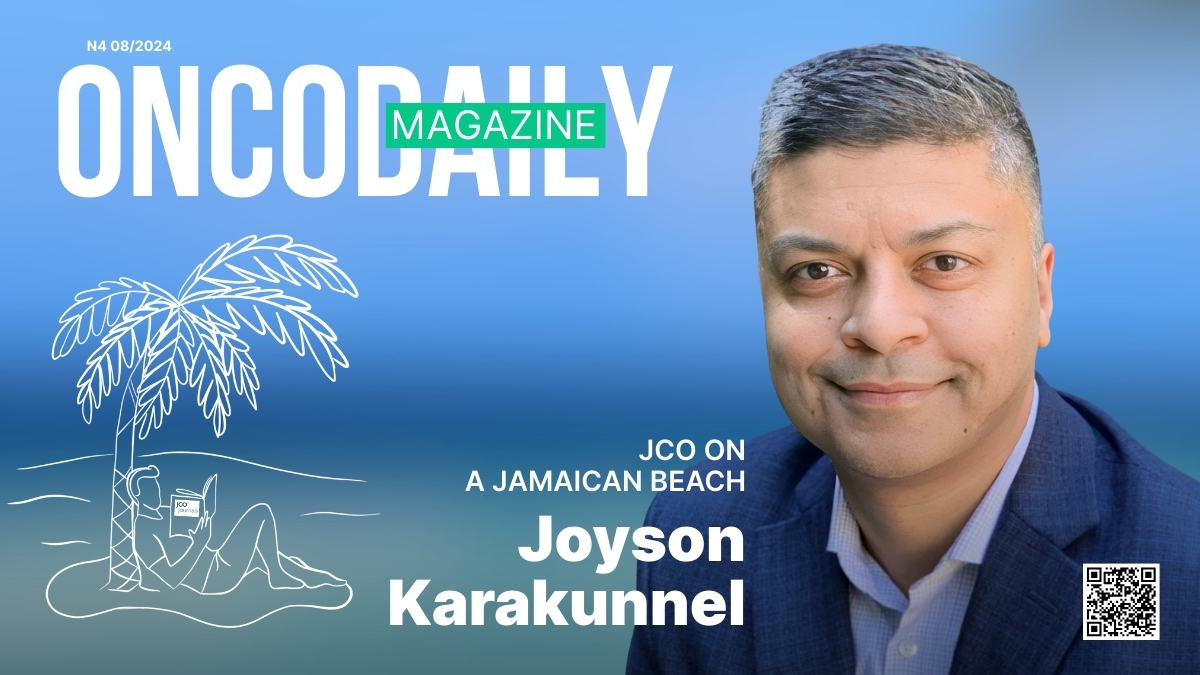“The fun is bringing peace to the chaos…”
When you sit down with Dr. Joyson Karakunnel, Senior Vice President and Head of Research, Oncology at GSK, the immediate impression is of a man who has lived many lives within one career—clinician, scientist, regulator, biotech builder, teacher, mentor. His story is not only about medicine but also about choices, pivots, and the pursuit of impact at scale.
From Finance to Medicine
Surprisingly, medicine was not his first calling.
“I actually didn’t ever want to go to medical school,” he admitted with a smile. “I really did not know what I wanted to pursue as a career. But my mom, who was a nurse, influenced me. She got me interested in medicine.”
That choice set him on a path from medical school to the frontlines of oncology. “During medical school, I interacted directly with patients. I saw firsthand how little we know about many diseases. We think a drug should work, but sometimes it doesn’t. We add others. That uncertainty fascinated me—and troubled me.”
Residency and fellowship brought him to the National Cancer Institute (NCI), where oncology and hematology revealed itself as both a scientific and human calling. “I saw the intersection of helping patients and watching science evolve,” he recalled. “At that time, small molecules were on the rise, then monoclonal antibodies, and now immunotherapies, then ADCs and much more. Each iteration advanced our knowledge.”
For him, the principle was always clear: science had to lead somewhere. “It had to help patients in the long run,” he said firmly. That belief drew him deeper into oncology and, eventually, into drug development.
At the Forefront of Immunotherapy
Looking back, he sees a career defined by witnessing—and shaping—major transitions in oncology. “In my early days, I worked with small molecules,” he explained. “Then came immunotherapies. I was fortunate to be at the forefront, particularly with Durvalumab. I helped design some of the first immunotherapy combination trials in lung cancer. It was a whole new generation of drugs—using a patient’s own immune system. That modality opened an entire field, and we’ve all seen what it’s been able to do to advance the field of oncology.”
The evolution continued. “Later, with ADCs, we once again gave patients another option. That’s what matters most—giving patients more possibilities, more hope.”
Dr. Karakunnel paused before adding: “Everything for me has always centered around the patient. That’s what drives me.”
Leaving the Clinic for Industry
Like many physicians, he wrestled with the decision to leave clinical practice. “I practiced for about four to five years,” he clarified. During that time, he wore many hats: private practitioner, academic hematologist and oncologist at NCI and the National Naval Medical Center, even hospitalist.
Private practice offered intimacy with patients but also bureaucracy. “I gave eulogies for patients I treated at the National Naval Medical Center,” he said softly. “Those interactions are unforgettable. But in private practice, administrative burdens started to erode the time I had with patients.”
Academia, he loved. “I might have stayed,” he admitted. “But in biotech and pharma, I saw a way to impact many more people at once. Life is short. I wanted to reach as many as I could.”
What he feared losing—the science and the teaching—he found again in industry, in new forms. “Pharma does incredible science,” he said. “And teaching didn’t go away but came in different ways—seminars, one-on-one mentorship and I kept learning too. That duality—teaching and being taught—was very fulfilling.”
Biotech, he added, brought a different challenge. “In biotech, when you have ten or twenty people, it’s chaotic—multiple things moving at once. The fun is bringing peace to the chaos, watching a company grow, blossom, and do amazing things. You see it evolve from the ground up.”
A Career Across Continents and Companies
His résumé reflects a panoramic view of oncology and hematology R&D. After NCI and FDA, he joined MedImmune/AstraZeneca, helping develop immunotherapies and combinations. From there, he became VP at Arcus Biosciences. He was then CMO at Tizona Therapeutics, which was acquired by Gilead, and part of the founding team for Trishula Therapeutics.
Joyson Karakunnel led Innate Pharma, a NASDAQ- and Euronext-listed company in France focused on NK cells, as CMO. He served as an advisor to the Chief Medical Officer for the Parker Institute of Immunotherapy, when it was growing from just a handful of people. He served as interim CMO at iTeos Therapeutics and now sits on the boards of Abalytics Oncology, Precision Biosciences, and Primevax, each with distinct modalities—from ADCs to bispecifics to viral based immunotherapies.
“Now at GSK,” he said, “I oversee oncology from target selection through proof of concept in clinical trials. Through my career, I’ve led preclinical, phase I, phase II, phase III and approvals—which spans the drug development spectrum. I’ve been fortunate to have worked with very good people who have helped me develop this experience.”
Guided by Mentors
When asked about mentors, he doesn’t hesitate. “The biggest impact on me was William Dahut at the NCI. He guided me not just scientifically but personally, helped me keep my head on straight.”
In industry, two more figures shaped him: Ramy Ibrahim, his first manager at MedImmune and who he later collaborated with at the Parker Institute where Ibrahim held the role of CMO; and Mondher Mahjoubi, CEO of Innate Pharma, now Chief Patient Officer at GSK. “They taught me how to interact with people, how to develop drugs, and how to align my priorities.”
And on a more personal level? “My parents and family,” he said simply. “They kept me level-headed no matter where I went or what I did.”
Facing Challenges, Shaping the Future
When asked about the most difficult moment in his career, Joyson Karakunnel didn’t point to boardrooms or high-stakes biotech trials. Instead, he returned to the very beginning.
“One of the most difficult times I ever faced was before I even got into pharma,” he reflected. “After graduating from the NCI Hematology-Oncology Fellowship—a very academic, science-driven program—I went straight into private practice. No help. No clinical trials. Just myself.”
“I had to see far more patients than I ever had in academia. For the first six months, I had to keep my head straight, stay concentrated, and push through. That challenge shaped me. It prepared me for jumping from big pharma to small biotech, from private companies to public ones. People think being a CMO is the same everywhere—it’s not. In one company, you interact with investors, and analysts while building an organization; in another, you don’t have those levels at all and instead are in a more mature organization trying to bring peace to the chaos. That early challenge taught me how to face changes head-on, every single day.”
Advice to the Next Generation
What would he tell the younger generation now looking at a career in oncology? His answer was simple, almost disarmingly so.
“Enjoy your job. Enjoy what you do. If you have fun with it, you’ll achieve what you want to,” he said with a smile. “Find your work interesting. And above all, help people. As doctors, that’s the one way we can truly give back. If you do that, not only will you succeed in your career—you’ll live a much more fulfilled life.”
The Future of Oncology
Looking ahead, Dr. Karakunnel believes the near future lies in refining technologies we already have. “In the next two to three years, we’ll continue to advance ADCs, T-cell engagers, and new iterations of antibodies like multi-specifics,” he predicted. “That’s where the field is evolving.”
His hope stretches further. “My hope for the future is —, we’ll have higher cure rates. Look at testicular cancer: 90–95% of patients do not relapse after getting treated with chemotherapy. They do really well. Imagine if more cancers reached that benchmark.”
And if not outright cures, he hopes for transformation. “I’d love to see cancer treated like hypertension or diabetes—manageable, chronic, but not life-ending. My father is about to turn 89. He has hypertension, diabetes, and still climbs ladders. If we can bring cancer to that stage, it would be a huge victory.”
The Next Chapter of Immunotherapy
When the conversation turned to immunotherapy, Dr. Karakunnel was both cautious and optimistic. “We hit the first wave—PD-1s, which did well. Then CAR-Ts, which brought efficacy but also has its own challenges. Now we’re seeing early exciting data with T-cell engagers, and we look forward to seeing what develops in the future.”
But, he admitted, “We went into immunotherapy thinking we knew more than we did. Now, as we peel back the onion, we’re realizing how much we still don’t know. That’s exciting—because it means there’s so much more to discover.”
JCO on a Jamaican Beach
When asked about books that influenced him, Joyson Karakunnel laughed. “That’s one of the toughest questions. I’m not a big reader outside of science. My wife and I went to Jamaica —she was on the beach reading her novel. I was reading JCO,” he said, referring to the Journal of Clinical Oncology.
I suggested the perfect title for the interview: JCO on a Jamaican Beach. He laughed again. “I’m sure they’d love that one,” he said. “But honestly, I spend more time with journals, articles, the latest science. That’s my reading.”

AI: The New Frontier
The role of artificial intelligence in oncology is a topic he approaches with the same realism. “It reminds me of immunotherapy. There’s a lot of excitement about AI/ML and it continues to evolve.”
He sees three groups at the table: programmers who write algorithms, biologists who understand the science, and a critical but often missing piece—the translators between the two. “The programmer says, ‘I can code this.’ The biologist says, ‘I don’t know if it’s useful.’ They don’t speak the same language. That’s where we need evolution.”
Still, he sees immense promise. “AI will impact every stage—target discovery, drug development, clinical trials, even regulation. It won’t happen overnight, but it will happen. And as our data grows, both public and proprietary, we’ll get better at using it. That’s what will really drive change.”
“Either cure cancer or make it like hypertension or diabetes…”
And what drives him today? “I still find my work interesting and fun. I love science—sometimes too much. There’s so much of it, I struggle to go deep into just one area. And above all, if I can make an impact for people at a broader level, I’ll feel I’ve accomplished something.”
Finally, I asked the question I ask everyone: What is success for you?
His answer was thoughtful. “Ten years ago, I’d have defined it by my career milestones. Now, it’s different. Success for me is getting more treatments to people, building a paradigm where we either cure cancer or make it like hypertension or diabetes. If I can see that before I die—that will be success.”
Interview by Gevorg Tamamyan, the Editor-in-Chief of OncoDaily


